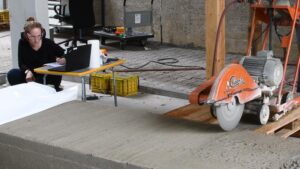
New Concrete Testing Facility Enhances Road Construction Efficiency

Director of the MPA Prof. Harald Garrecht at the commissioning of the testing facility. The new road paver is on the right.
University of Stuttgart / MPA
A testing facility for optimizing concrete roadways has been inaugurated at the University of Stuttgart.
70 percent of passenger and freight traffic today goes by road. Road surfaces made of concrete are especially well suited for the high stresses this involves, because they are both robust as well as long-lasting and can be recycled in high quality at the end of their lifespan. However, it would be preferable if replacement cycles were even longer, because this would save on resources as well as reduce the number of roadworks and accidents.
Researchers at the University of Stuttgart are investigating how the lifespan of concrete roadways can be improved further by means of digitization as part of the “Concrete Roadway 4.0” project, which has received EUR 4.7 million in funding from the Federal Highway Research Institute (BASt). At the end of the project, a test bench and a concrete mixer were inaugurated at the University of Stuttgart, which can be used to test new forms of concrete as well as mixing technologies and sensor technologies.

University of Stuttgart / MPA
The concrete strip laid by the team managed by Prof. Harald Garrecht from the Materials Testing Institute (MPA) at the University of Stuttgart to inaugurate the testing facility at the Campus Vaihingen is just five meters long and around one meter wide. The concrete strip is groundbreaking: “The roadway is made up of only one layer. This is much more complex than how they are usually created in roadworks using multiple layers”, explains Garrecht. The testing facility can do even more. “With the test bench, we can investigate various issues related to construction, material and processes at the pilot-plant scale and then scale them up to full size.
This includes, for example, testing different concrete mixtures as well as managing the consistency in order to investigate the optimum paving quality. Likewise, the setting behavior can be recorded using the testing facility, as well as post-processing steps such as grinding the roadway and applying grooves. It is also possible to work out the ideal time to cut into the roadway, which is necessary to avoid any uncontrolled fractures when the road surface is solidifying.
The production quality is improved by optimizing the individual production steps, from material to transport and installation through to post-processing. This means that in the future, it will be possible to produce roadways which reduce the need to carry out maintenance work to a minimum because of their extra durability. “Thanks to the facility, we can produce concrete roadways which have the necessary quality in terms of flatness, durability and resistance to deal with the increasing volume of traffic in the future”, emphasizes Garrecht.
The centerpiece of the test bench alongside the road paver itself is a mixing unit made by the company Liebherr, which is attached to an aggregate silo for feeding as well as a cement silo. A key innovation here is the powertrain for rheological (based on the flow properties) mix feeding, which was created in cooperation with the companies Liebherr and Cavex as well as the Institute for System Dynamics (ISYS) and the Institute of Construction Materials (IWB) at the University of Stuttgart, for which a new transmission has been developed.
The new test bench was developed as part of the “Concrete Roadway 4.0” research project. Since 2017, a consortium made up of partners from industry and science has been carrying out research into the roads of tomorrow at the MPA. The aim is to digitally network all parties involved in the process of building concrete roadways. Concrete Roadway 4.0 receives EUR 4.7 million in funding from the Federal Highway Research Institute (BASt)’s Innovation Program for Roads. The project partners from the University of Stuttgart include the Materials Testing Institute (MPA), the Institute of Construction Materials (IWB) and the Institute for System Dynamics (ISYS). Other partners include the companies CAVEX GmbH & Co.KG, Otto Alte-Teigeler GmbH, Wirtgen GmbH, Liebherr GmbH, Heinz Schnorpfeil Bau GmbH as well as Lehmann & Partner GmbH.
Wissenschaftliche Ansprechpartner:
Prof. Harald Garrecht, Dr. Frank Lehmann, Materials Testing Institute (MPA) University of Stuttgart, Phone +49 (0)711 685-63323, – 66788; harald.garrecht@mpa.uni-stuttgart.de, Frank.Lehmann@mpa.uni-stuttgart.de












